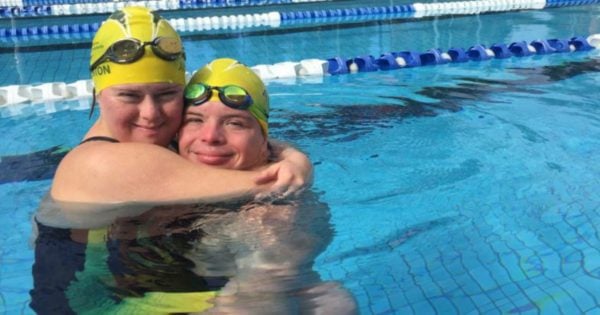Last night’s Australian Story was more familiar to my family than most.
Aptly titled ‘Tough Love’, the episode featured the very much in love Michael Cox and Taylor Anderton, a young couple who also happen to have Down syndrome.
Michael and Taylor have been dating for two years, and engaged for one. They cannot wait to be married, and afterwards, they want to have four children together.
Catherine Musk, Taylor’s mother, said in the opening moments of the episode, “Taylor and Michael want to get married and have children, and that makes me feel very worried. It’s not going to happen. It can’t happen.”


Top Comments
This scenario played out in our family a few years ago, and it was disastrous. My (then) 20 year old cousin who has a chromosomal disorder and the mental age of a 9 year old, fell pregnant to an abusive man and was at risk of having the baby taken at birth by the authorities. An aunty stepped in and rallied other family members to help teach her how to mother the bub, feed, bathe, etc - all to no avail. Someone had to live with her 24/7 (4 of us took shifts of a few days at a time) as once the excitement of all the visitors and attention and gifts wore off, she completely lost interest in the baby - not wanting to feed her etc. She was completely and utterly unable to care for the child, and unfortunately her own mother was unable to help due to mental illness issues - and the rest of us had our own lives, children and jobs to go back to, so bub was surrendered to foster care. We tried to have my cousin fitted with a reliable contraceptive, but DSQ blocked us at every opportunity, resulting in the birth of 3 more babies to different men over the next 3 years. All of the children are in foster care and all have inherited serious chromosomal disorders which adversely affect their health. My cousin didn't want children - she wanted a cute baby to play with, she wanted to be fussed over, she wanted gifts and cards and visitors. Once all of that stopped - she didn't acknowledge the babies at all and they became in serious danger of dying of neglect and starvation without intervention. As a family, we knew that this would be the outcome - but because my cousin has 'rights', all responsibility for the consequences of her sexual activity went out the window. It could all have been avoided, and it broke our hearts to see those babies taken away one by one. I'm not saying this would be the case in every scenario, but this was our experience.
Such a well written personal article. Thank you Jessie.
If we consider the reason for this "argument/discussion", which is simply that everyone and anyone has the right to make choices for their own lives, I have to agree. However, as the mother of a child with a very complex genetic condition, who at last assessment, was considered to not have an intellectual disability because he scored 2 points over the IQ defining an intellectual disability, I have to say that soooooo much more needs to be considered. It is never black and white.
If I freely allow my son his basic human right to eat food and drink whenever he is hungry, then he would be dead! So I have to restrict his access, simply for his own wellbeing. There is no cure for such a genetic condition, so that will need to be the case for the rest of his life.
Are people arguing for the wellbeing of Michael and Taylor, as their parents are clearly doing? Or are people shocked and upset that we have to restrict and control, thereby removing "basic human rights"?
And who can honestly believe that fully funded support would be readily available for parents with a disability to help them care for the life long needs of their child, who may end up having even more complex needs than they have themselves??? My son is registered on the Disability Support Register but has not been allocated a funding support package, simply because THERE ARE NOT ENOUGH FUNDS!!!!
Why is it so horrifying for the parents of an adult with a disability to actually think ahead about what their child's future would be like and say that it scares them! I am scared everyday, just thinking about the future for my son, and of course his sister who could end up being his carer. No one cares more for their child than a parent. Allow them to freely make the extremely difficult decisions that need to be made in the best interest and wellbeing of their child. Don't make a judgement until you walk a week in their shoes!